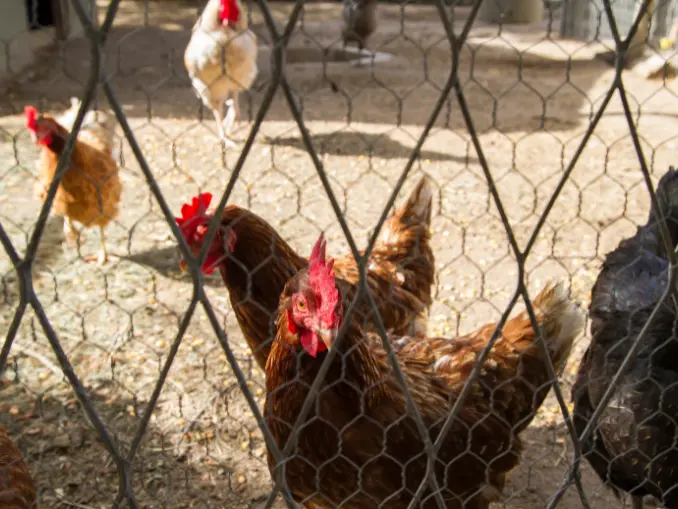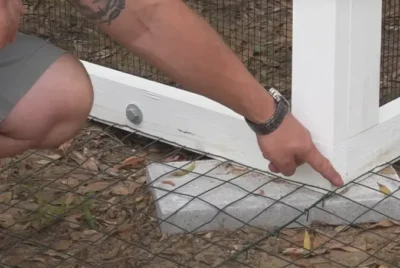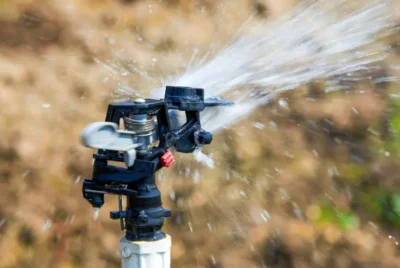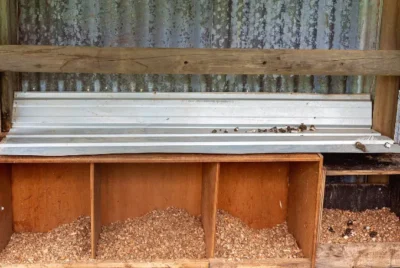How To Maintain Chicken Coop for Long-Term Predator Protection
Predator attacks on your beloved chickens can be devastating, not only emotionally but also financially. Losing a cherished member of your flock or even the entire flock can be excruciating.
To prevent such heartaches and safeguard your chickens for long-term predator protection, understanding how to maintain a predator-proof coop becomes not just a necessity but a crucial mission. In this article, we’ll delve into the essential strategies and practices that will help you protect your chickens from these relentless predators and ensure their safety and security for years to come.
Regular Cleaning and Sanitation
The importance of cleanliness in deterring predators cannot be overstated. A clean coop and surroundings help prevent the buildup of odors and waste that can attract predators. When your coop is well-maintained and hygienic, it is less likely to be an appealing target for potential threats like raccoons, weasels, or rodents. Cleanliness also reduces the risk of disease transmission among your flock, contributing to their overall health and safety.
Establishing a cleaning schedule and routines is crucial. Create a regular cleaning schedule that includes removing soiled bedding, cleaning and disinfecting the coop, and replacing litter or bedding materials. The frequency of cleaning your coop may differ depending on the size of your flock and the coop’s size, but consistency is key.
Proper waste disposal methods are vital to prevent attracting predators. Ensure that you dispose of chicken waste, such as manure or soiled bedding, in a manner that doesn’t create odors or accessible food sources for predators. Composting or using designated waste bins can be effective ways to manage waste safely.
Lastly, keeping food and water areas clean is essential. Remove leftover food promptly to prevent attracting rodents or scavengers. Regularly clean and refill water containers to ensure a fresh and clean water supply for your chickens.
Secure Coop Design and Construction
Opt for sturdy materials like treated wood or metal that are durable and resistant to wear and tear. Reinforce the coop’s walls and floor to make it difficult for predators to gain entry; this can include adding hardware cloth or wire mesh to windows and vents.
Additionally, installing predator-proof locks and latches on doors and access points is essential to prevent break-ins. Regularly inspect the coop for any signs of wear and tear or damage, such as holes in the walls or weak spots in the structure, and address them promptly to maintain its security.
Proper ventilation and lighting are also crucial factors. Ensure that your coop has adequate ventilation to regulate temperature and prevent moisture buildup, which can attract predators. Proper lighting not only promotes the well-being of your chickens but also deters nocturnal predators.
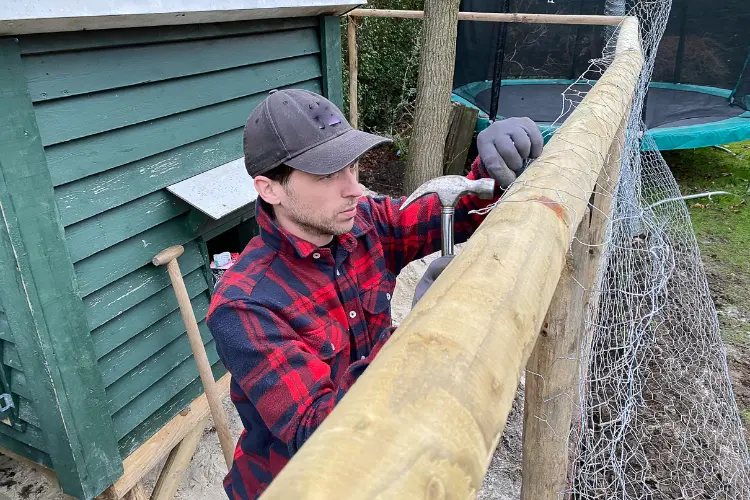
Fencing and Enclosure Maintenance
Consider using hardware cloth or welded wire mesh to withstand attempts by predators to break through. Regularly inspect the enclosure for any holes or gaps that could serve as potential predator entry points. Even small openings can be exploited by determined predators.
Address any issues promptly by patching or reinforcing the weak spots. To thwart digging predators like foxes or weasels, you can bury wire mesh around the perimeter of the enclosure to create an underground barrier. This prevents predators from tunneling into the coop area.
Lastly, if you notice any damage to the fencing, whether from weather or wear and tear, repair it promptly.
Nighttime Safety Measures
Implementing nighttime safety measures is essential to protect your chickens from nocturnal predators. Ensure all your chickens are safely inside the coop before nightfall. Predators are more active at night, so keeping your birds securely housed is critical.
Locking coop doors and windows securely is the next step. Use reliable locks and latches that are not easy for predators to manipulate. Consider using automatic door closers to ensure that the coop remains sealed once your chickens are inside, even if you cannot do it manually.
Regularly check for signs of nighttime intrusion. Look for any evidence of damage to the coop, compromised locks, or missing chickens. This allows you to promptly identify and address any security breaches, helping maintain a safe and secure environment for your chickens during the vulnerable nighttime hours.
Read also: Best Automatic Chicken Coop Doors: Upgrade Your Coop Today
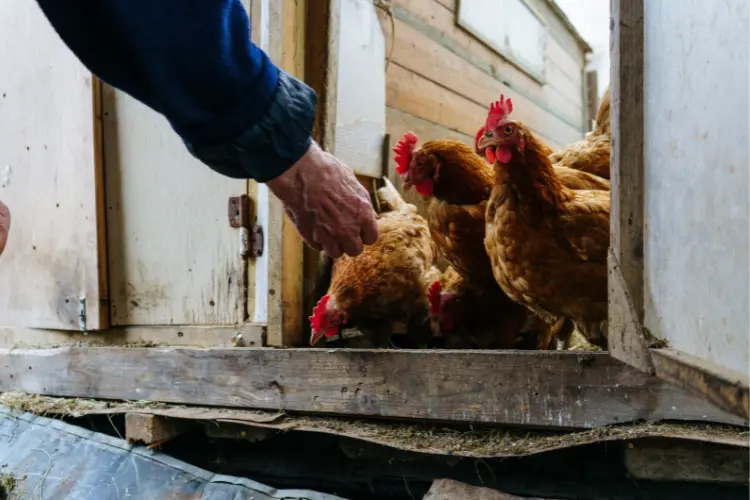
Landscaping and Vegetation Control
Landscaping and vegetation control around your chicken coop are essential for enhancing predator protection. To minimize potential hiding spots for predators, start by trimming shrubs and trees near the coop. Overgrown vegetation can provide cover for animals like raccoons and foxes, so keeping it well-maintained and at a safe distance from the coop is crucial.
Maintain short grass and vegetation near the coop to eliminate hiding places for ground-dwelling predators. Regular mowing and weed control can help create a more open and visible environment.
Consider applying natural deterrents, such as aromatic plants or herbs, around the coop. Some plants, like marigolds, lavender, or rosemary, can help repel certain pests and predators with their strong scents.
Regular Inspections
Regular inspections of your chicken coop and its surroundings are vital for long-term predator protection. To ensure a safe environment for your chickens, establish a routine inspection schedule. This schedule should include regular checks during both daylight and nighttime hours to cover all potential predator activity periods.
During inspections, be vigilant for signs of predator activity. Look for tracks, scat, scratches, or evidence of digging near the coop. Also, inspect the coop itself for any damage, breaches, or vulnerable areas that may have been compromised.
Address any maintenance issues promptly. If you discover damaged fencing, locks, or other security features during your inspection, take immediate action to repair or reinforce them. Swift response to these issues is essential to maintaining a secure environment for your chickens and preventing potential threats from gaining access.
Education and Training
Firstly, consider training your chickens to return to the coop at night. You can establish a routine where you provide food and water inside the coop at dusk, encouraging them to go inside on their own. Over time, they will learn this behavior and seek shelter when night falls, reducing their vulnerability to nighttime predators.
Educating family members or caretakers about predator threats is equally important. Make sure everyone involved in caring for the chickens understands the risks posed by various local predators and knows how to implement security measures effectively. This includes knowing how to securely lock the coop, recognizing signs of predator activity, and following a protocol in case of a predator threat.
Additionally, learn about local predators and their behavior. Understanding the specific threats in your area, such as raccoons, foxes, or hawks, can help you tailor your predator protection strategies accordingly. Knowledge of predator behavior can guide you in implementing measures to deter or repel them effectively.
By combining training for your chickens, educating those responsible for their care, and gaining knowledge about local predators, you can significantly enhance the long-term security of your chicken coop.

Emergency Preparedness
Having a plan in case of a predator attack is essential for long-term predator protection. Create a plan outlining the steps to take if a predator threatens. This plan should include procedures for securing the coop, protecting your chickens, and, if necessary, contacting local wildlife authorities or animal control.
Stocking essential supplies for emergencies is also important. Maintain a well-stocked emergency kit with items like first aid supplies, extra fencing materials, temporary shelters, and necessary repair tools. Having these supplies readily available can make a difference in addressing a predator attack promptly.
Moreover, know how to contact local wildlife authorities or animal control in an emergency. They can guide, assist, or intervene when dealing with particularly persistent or dangerous predators. Having their contact information readily available ensures you can seek professional help.
By being well-prepared for potential predator emergencies, you can minimize the risk to your chickens and respond effectively to threats, contributing to their long-term safety and well-being.
Maintain Your Chicken Coop for Long-Term Predator Protection
Long-term predator protection for your chicken coop requires a comprehensive approach that includes secure construction, diligent maintenance, and a commitment to cleanliness and safety. By following these strategies and practices, you can create a secure environment for your chickens, ensuring their safety and well-being for years to come.
For a more detailed exploration of advanced chicken coop security strategies, including additional tips and techniques, be sure to check out “A Complete Guide to Advance Chicken Coop Security Strategies.”
Remember, a well-protected coop not only safeguards your chickens but also provides peace of mind for you as a responsible poultry keeper.

